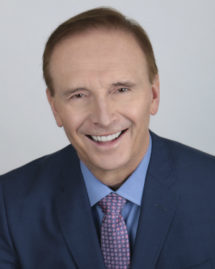Nolan Chang, MD, shares ways Kaiser Permanente is using AI to better the patient experience and reduce physician burnout.

Edward M. Ellison, MD, shines light on epidemic of physician suicides
USA Today opinion piece underscores physician burnout and the need for physician wellness programs

Edward M. Ellison, MD, executive medical director and chairman of the Southern California Permanente Medical Group (SCPMG), today shares his first-person experience as a physician who pulled back from the brink of burnout, writing a USA Today opinion piece that calls attention to the issue and highlights the need for physician wellness programs.
In “Stepping back from the brink of burnout: How I’m tackling the epidemic of physician suicides,” Dr. Ellison describes how – consumed by the responsibilities of a demanding new role and dealing with the grief of losing his mother after a prolonged battle with dementia – he kept pushing to honor his commitments. As the physical manifestations of stress intensified, he realized the need to acknowledge that his health was at risk as a first step to combating burnout.
In recounting his own story, Dr. Ellison notes that many colleagues in health care drive themselves beyond exhaustion and into depression, putting them at increased risk of suicide. He notes that an estimated 300 to 400 physicians in the United States take their own lives each year. Furthermore, suicides among male physicians are 40 percent higher than the general population, and among female physician a staggering 130 percent higher.
To combat this trend, Dr. Ellison relates the steps he took to embrace and advocate for physician wellness. These steps included appointing a physician chief wellness officer at SCPMG, and how the medical group subsequently worked to support physician wellness by transforming systems, offering wellness solutions, and providing greater schedule flexibility to provide better work-life integration.
By speaking and writing about physician wellness, Dr. Ellison frequently has turned a spotlight on the need for health care organizations to address physician and health employee burnout. In a TEDx talk last year, he spoke of the need for leaders in health care to take ownership for the creation of a wellness culture that supports physician health. In a recent Permanente Medicine podcast, he shared the ways he transformed his life to avoid burnout, and in an interview last summer with Health System Specialist, a new publication from the Financial Times, he shared the variety of wellness programs SCPMG offers its more than 7,000 physicians, from stress management classes to meditation sessions.
Along with his leadership role with SCPMG, Dr. Ellison also serves as chairman and CEO, The Southeast Permanente Medical Group, and co-CEO, The Permanente Federation.
To read the complete opinion column, visit the USA Today website.


